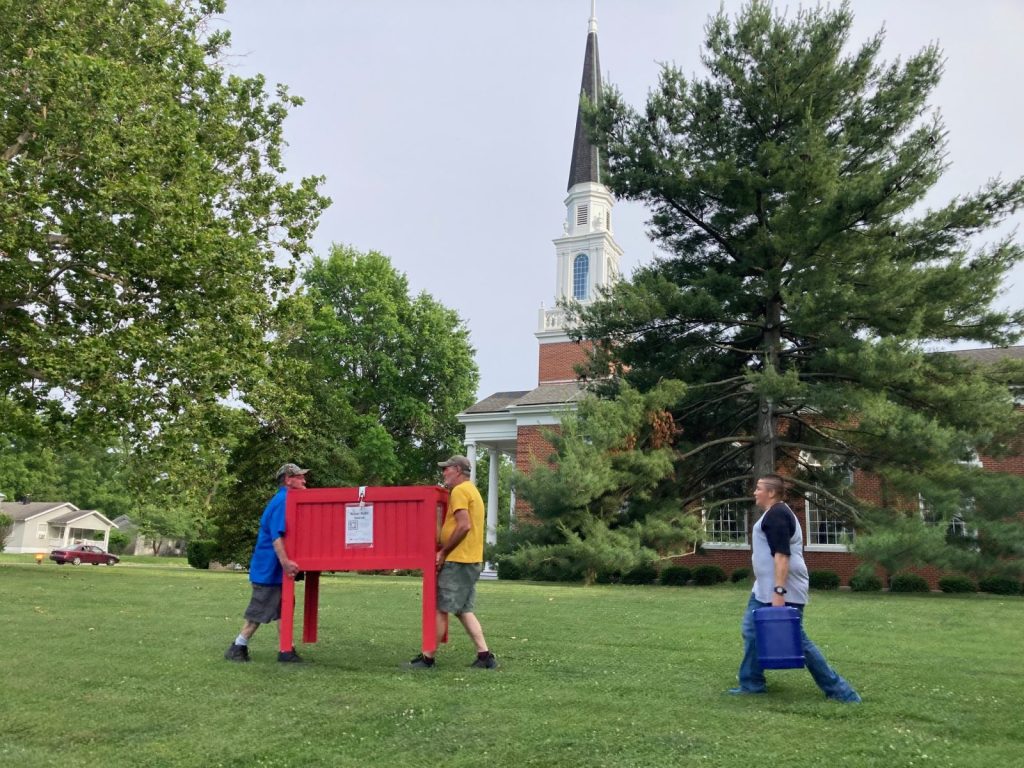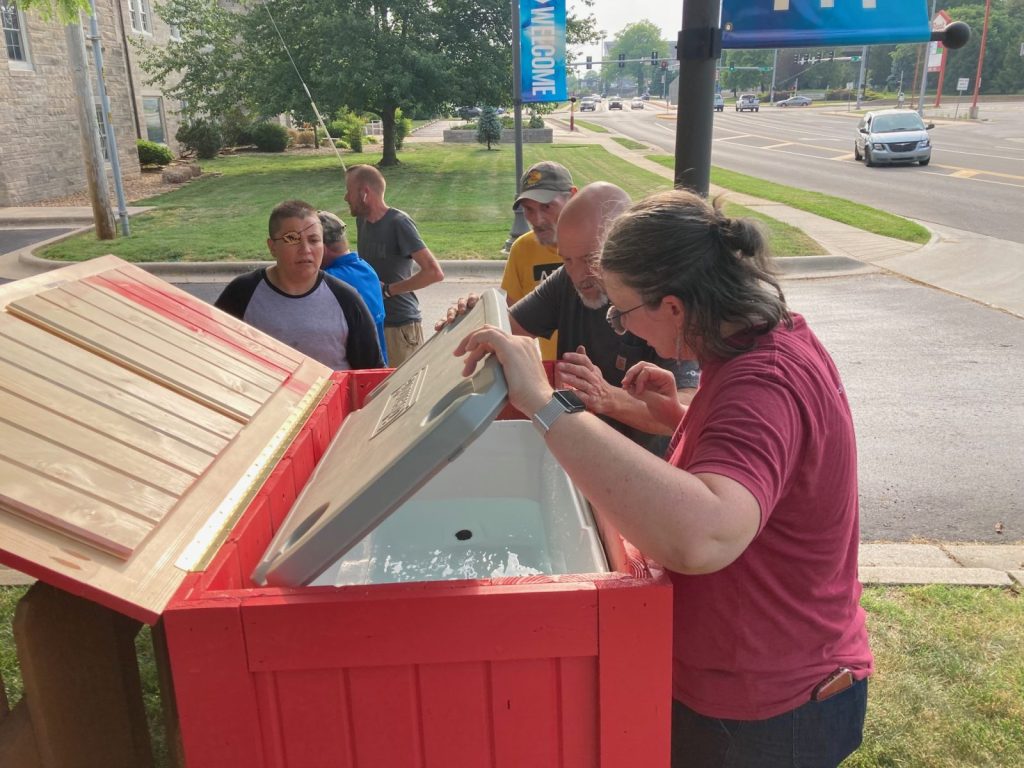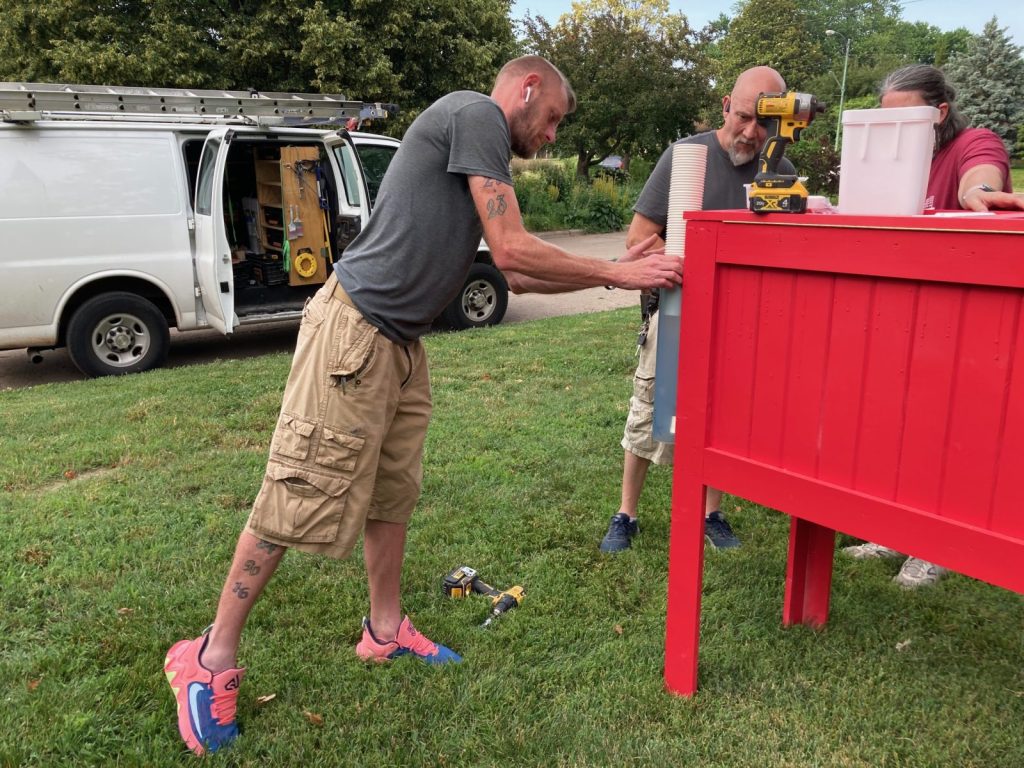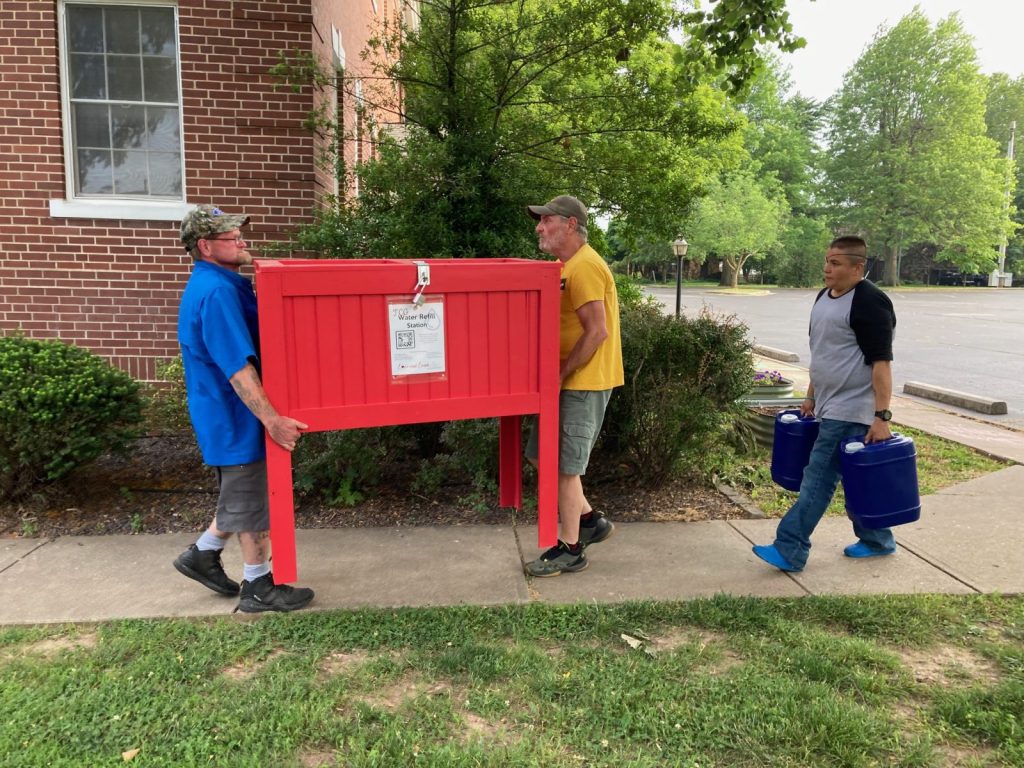Mike Gariss and T.J. Potter know all too well what it’s like to be homeless in the Ozarks during summertime.
“It was terrible,” Gariss said. “It’s hot. You can get dehydrated real quick. Back when I was on the streets, we were living in tents. And if you’ve ever been camping, you know how hot it gets in tents in the summertime.”
Potter agreed.
“A lot of gas stations, if you got a backpack, they won’t let you inside,” Potter said. “You got to stay outside with your stuff. So you can’t go in to get something to drink because you don’t want somebody to steal your stuff.”
Gariss and Potter lived in Springfield’s unsheltered community for a few years before finding beds in the Connecting Grounds’ transitional shelter program.
They and other members of the Connecting Grounds’ Lived Experience Cohort spent Friday evening placing handmade water stations in different locations around Springfield. The stations offer unsheltered persons clean drinking water at no cost.

The Connecting Grounds, a church that focuses on helping the unsheltered community, used $5,000 in American Rescue Plan Act (ARPA) funds to purchase the supplies to build the water stations, plus 1,000 reusable water bottles that will be given to unsheltered people in Springfield.
The idea is to cut down on litter and single-use plastic bottles while giving unsheltered people free access to cold and clean water during the summer months, explained Connecting Grounds Pastor Christie Love.
“To me, summer is as dangerous, if not more dangerous than the winter because you can’t cool down once you’re hot,” Love said, watching Gariss and Potter load another bright red water station onto a box truck. “Getting dehydrated for our friends on the street is life threatening. We know that when we’re dehydrated, we don’t metabolize mental health meds the same. We are more prone to overdose.”
Water stations refilled daily
There will eventually be at least 10 water stations around Springfield.
The Shelter SGF App has been updated with an interactive Google map that shows their locations, as well as businesses and organizations — like Coffee Ethic and Victory Mission — that will allow unsheltered persons to come in during normal business hours and fill their water bottles.
Each water station has a small trash can bolted to the side and a recyclable-paper cup dispenser, in case someone doesn’t have a bottle.
The water stations are locked to prevent anyone from tampering with the water.

Members of Lived Experience Cohort will refill the stations with water and ice every evening.
“If you’re homeless and you don’t have a job and you don’t have money,” Gariss said, “you can’t just go to the nearest Kum & Go (gas station) and go in and get something to drink.
“There’s a limited number of spots that you can go to even get water,” he continued. “This is going to help out a lot because folks that can’t afford to go buy water at Kum & Go, they’ll be able to come up to the stations.”
The Lived Experience Cohort is made up of formerly unsheltered people who are now housed — several are among those in Connecting Grounds’ transitional housing or shelter programs — and are finding ways to help and advocate for the unsheltered community.
Joy in helping others

Gariss and Potter said they were proud to have their hands at work on the water project.
“I love it. Anything we can do that’s gonna help people out, I feel good about,” Gariss said. “It’s important to me because I’ve been out here.”
“Being able to help finish them today and help bring them out makes me feel good,” Potter said. “I’m glad to be a part of it.”
Potter went on to talk about how much the Connecting Grounds’ transitional shelter has helped him.
Love converted her church building into a cold weather shelter last fall. The city approved her request to convert the building into a year-round transitional shelter in April.
With the Connecting Grounds transitional shelter program, residents are provided case management services and must volunteer 15 hours every week at the Outreach Center to stay in the program.
The program requires sobriety, and random drug screens are part of the process.
With support from a case manager, residents set goals for themselves and complete weekly tasks to work towards those goals. Eventually, they gain stability and permanent housing.
There’s no set deadline on how many days a person has before they have to exit the program,
“It’s really helped me get up on my feet, and I’m loving it,” Potter said. “I don’t have to worry about my stuff. I know I’m safe. I’m doing everything I need to do to get my life on track. And I’m helping others, something I love.”
Potter said he was facing seven to 10 years in prison, but is able to avoid serving the time so long as he stays clean and completes his volunteer and work hours every week.
“It’s a great feeling,” he said. “I couldn’t ask for more. I am very blessed. Everything I’ve been helped with, it’s been a major improvement in my life.
To find a water station location, download the Shelter SGF app here.
Love said she is still looking for businesses or organizations on the east side of town — especially in the Chestnut Expressway and Glenstone Avenue area — to place watering stations. If you have a location and are interested in helping, fill out this contact form.


